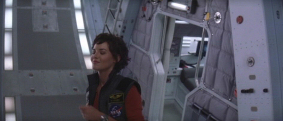Mission to Mars (Brian De Palma, 2000)


THE WHERE:
At home all by myself, kicking back and relaxing on a Saturday night.
THE WHY:
"It can be said with certainty that any reviewer who pans ["Mission to Mars"] does not understand movies, let alone like them". -Armond White, NY Press
"A critic who can't recognize the visual rhapsody of this movie (and I'm not talking about the special effects) is about as trustworthy as a blind dance critic." -Charles Taylor, Salon.com
Anytime two well-respected professional film critics -- who don't have the luxury of shooting from the hip or hyperbole that we amateurs do -- are willing to make such published condescending statements towards their fellow colleagues based on their opinion of a single film, one has to take notice. Moreso when those critics are two of my favourites and self-admitted "Paulettes". Moreso when it's Brian De Palma, who might just be the source of more inspired disagreement than any other filmmaker in history (and that is not hyperbole!)
How could I afford not to see this film?
THE UGLY:
"One of the great things about movies is they can combine the energy of a popular art with the possibilities of a high art. [...] That's part of the excitement in a movie [...] you get a sense of the different forces at work on the director." -Pauline Kael, A Last Conversation with Pauline Kael
Having read just about everything related to Kael, this was a concept that I was not merely aware of but was well-versed in. I could quote certain passages on the subject verbatim and indeed it was one of the main points-of-view that endeared Kael to me as a critic. But in film, like in any other art, the difference between knowledge and understanding can be vast. And while I had certainly had many great experiences with films that would qualify for this category, it's something I feel that I understand much better after having watched Mission to Mars.
 With this film, De Palma reminds us that film is primarily a visual art form. An obvious fact, right? You would think so. Even many critics seem to not get it. They talk about a film's visual beauty in terms of other mediums. When they say that Marie Antoinette is beautifully shot, what they really mean quite often is that the objects being shot are beautiful: castles, interiors, clothes etc. Certainly a lot of things in the film look nice, but few of those have to do with anything Sofia Coppola is doing as a director. If this is our criteria for judging a film then we might as well just make movie slideshows of the 10 most beautiful paintings and photographs of all-time.
With this film, De Palma reminds us that film is primarily a visual art form. An obvious fact, right? You would think so. Even many critics seem to not get it. They talk about a film's visual beauty in terms of other mediums. When they say that Marie Antoinette is beautifully shot, what they really mean quite often is that the objects being shot are beautiful: castles, interiors, clothes etc. Certainly a lot of things in the film look nice, but few of those have to do with anything Sofia Coppola is doing as a director. If this is our criteria for judging a film then we might as well just make movie slideshows of the 10 most beautiful paintings and photographs of all-time.This is the perfect film to illustrate the value of the Auteur theory. If you were to just look at the script, you might say that it's an interesting concept, but it's certainly a genre piece through and through, even the dialogue is pretty corny. But what ends up on the screen is anything but. Usually when a great director takes on a genre piece, quite often you can tell that he's given up some parts as being dead-on-arrival in exchange for the chance to do something signature and fantastic with a scene or two. That's not the impression you get from Mission to Mars. De Palma manages to squeeze something wondrous or beautiful or hypnotic into just about every scene.
 Watching the scene with the killer vortex again, a sequence where any director would be justified in throwing in a bit of action for the sake of entertainment, De Palma instead plays it about as serene as one could play a scene like that. Even as it's sucking up the astronauts, the overall tone of the scene is less about kinetic energy or suspense, and more about a sense of wonderment. It's as if De Palma himself is oblivious to what is happening plot-wise and is just as curious as the astronauts are as to what this strangely beautiful thing is. Even in the midst of the suspenseful scene where the astronauts are desperately trying to fix the oxygen leak, De Palma is willing to spend just as much time on the "visual rhapsody" of the film that he's able to find in the graceful manner in which the astronauts move about in zero-g or even the soda spiralling out of the hole in the spaceship.
Watching the scene with the killer vortex again, a sequence where any director would be justified in throwing in a bit of action for the sake of entertainment, De Palma instead plays it about as serene as one could play a scene like that. Even as it's sucking up the astronauts, the overall tone of the scene is less about kinetic energy or suspense, and more about a sense of wonderment. It's as if De Palma himself is oblivious to what is happening plot-wise and is just as curious as the astronauts are as to what this strangely beautiful thing is. Even in the midst of the suspenseful scene where the astronauts are desperately trying to fix the oxygen leak, De Palma is willing to spend just as much time on the "visual rhapsody" of the film that he's able to find in the graceful manner in which the astronauts move about in zero-g or even the soda spiralling out of the hole in the spaceship.The funny thing is that observations about these sorts of visual tangents are usually brought up for castigating a director because a critic believes that they have ceased to serve the film and instead are looking to impress the audience (perhaps because they really have nothing to say or don't know what else to do). I think this is what so many critics misinterpreted in Mission to Mars, they are right that De Palma is not serving the plot with these tangents, but that's because the plot is not the focus of the film, but rather the tone. The best proof of De Palma's intentions with his visual sequences can probably be found in the scene where the shuttle blows up as the crew prepares to enter Mars' atmosphere. Surely if there were a scene were you would want to give the audience a thrill would be a spaceship being blown apart right? Well, De Palma passes up that opportunity definitively: there is no real build-up to the scene and the actual explosion is shown in only one shot that lasts for less time than that of the soda spiralling out of the ship.
In the film Before Sunrise, Ethan Hawke's character asks the question of why is it that a dog sleeping in the sun is beautiful, but a guy trying to get money from a bank machine looks like an idiot? Take a director like Ingmar Bergman, there is no mistaking his films for anything else except Art, or mistaking him for anything but an Artiste, both with a capital A. His films look artsy, they sound artsy, and center around artsy themes. He, like just about every other Artiste, is starting with the sleeping dog in the sun, Mission to Mars is the guy getting money from the bank machine. From this point of view, who is really taking the bigger artistic risk? Who's film is the more ambitious? De Palma is willing to stick his neck out and be artistic, be sincere without the support of the artistic pretensions that we've come to expect to accompany artistic films. Just like the aliens of the movie codify a message within the radio static from Cydonia, De Palma has codified an artistic masterpiece within the constructs of seemingly pedestrian mainstream film. And this for me constitutes a greater, more beautiful and meaningful filmic accomplishment than any sort of interpretive symbolism you'll find in a Bergman or Fellini film. If their films fail they at least have the justifications of importance, meaning, and above all, Art! De Palma however is all-in, not only has he made his art harder to decode by giving none of the classical external clues, but his film has no back-up if you don't get it as the characters, plot or dialogue really hold little value in and of themselves.
 I think of the space dancing sequence preceded by Connie Nielsen's character walking along the rotating portion of the ship. It plays like a direct homage to some of the most famous scenes from 2001: A Space Odyssey, except that instead of the Blue Danube Waltz, De Palma gives us Van Halen's "Dance the Night Away". Even as I was enraptured by this scene I couldn't help but chuckle as I imagined De Palma deliberately changing the music in order to separate the viewers who, as Armond White bluntly put it, "understood movies" from those who didn't (especially when you consider two other points: i) the entire score by Ennio Morricone is decidedly classical and ii) this is the one and only time a pop tune is played throughout the film).
I think of the space dancing sequence preceded by Connie Nielsen's character walking along the rotating portion of the ship. It plays like a direct homage to some of the most famous scenes from 2001: A Space Odyssey, except that instead of the Blue Danube Waltz, De Palma gives us Van Halen's "Dance the Night Away". Even as I was enraptured by this scene I couldn't help but chuckle as I imagined De Palma deliberately changing the music in order to separate the viewers who, as Armond White bluntly put it, "understood movies" from those who didn't (especially when you consider two other points: i) the entire score by Ennio Morricone is decidedly classical and ii) this is the one and only time a pop tune is played throughout the film).De Palma hides his art underneath a very thin veneer of pop. Actually even that isn’t fair, he fully embraces it, he sees no contradiction. It’s funny how the elitists have managed to even get those who don't care about cinema as an art-form to buy into this idea that art can't also be fun it must be serious, or that it must be cynical rather than sincere. As Kael famously said, if movies aren’t entertainment, what are they? Work?
Fantastic reviews and insights on Mission to Mars:
2 Comments:
Mission to Mars is 2001 for dummies, DePalma's "art" consists of vulgarizing things others have done well and convincing critics that this is some sort of genius act. John Huston used to tell a story about two producers lost in the desert who find a canteen full of pineapple juice. "Wait," one of them says, "let's piss in it first." DePalma has cut the artistic middleman out of that process.
Any blanket dismissal of Brian De Palma is so self-evidently stupid, that I am not surprised no one on the Internet has bothered to reply to "Michael"'s comment in 11 years.
Meanwhile, Mission To Mars continues to age quietly, and well.
Every once in a while, I see another positive retrospective on it, on various news and entertainment websites.
Post a Comment
<< Home